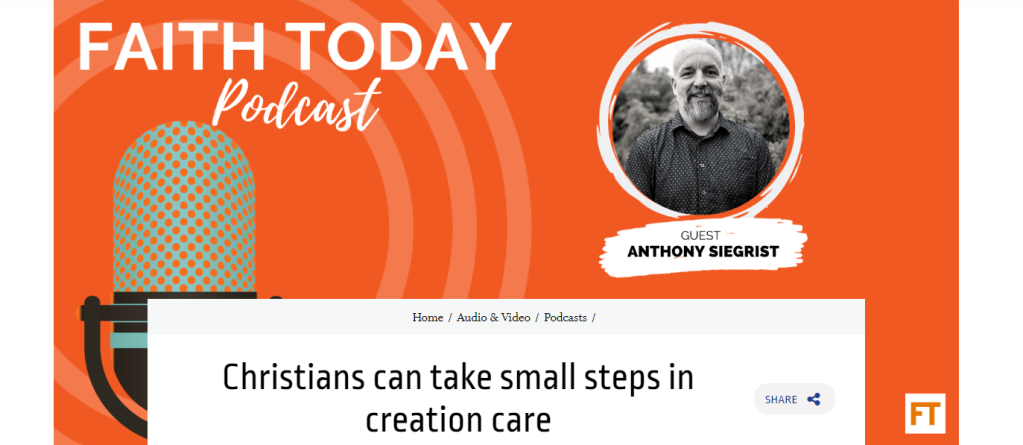Here’s a link to the podcast version of my conversation with Faith Today editor and host Bill Fledderus. Once again, I appreciate their interest in the topic.
Interview in Faith Today
Here’s the text of an interview I did a couple of month’s back with Faith Today magazine. I’m thankful for their interest in A Rocha’s work here in Ontario. Hopefully more Christian communities catch the vision for making creation care a part of their ministry, as both a response to God’s clear call and as a much-needed contribution to the common good. We could make a difference!
Crawford Lake, Kenosis and the Value of other Lives
Texts: Phil 2:1-13; Ex. 17:1-7
There is a lake in Ontario that intrigues scientists from around the world. This is true of several lakes, but today I’m thinking specifically of Crawford Lake. The Washington Post described Crawford Lake as “modest—just a pretty little pool at a park in the Toronto suburbs.” But Crawford Lake is unique. Because it is very deep and not very wide, the deepest water does not mix with the water on the surface. In most lakes the surface water and deep water periodically mix. A few however, like Crawford Lake, are meromictic: their layers do not mix, what goes down stays down.
Continue reading “Crawford Lake, Kenosis and the Value of other Lives”“They Looked toward the Wilderness”
Text: Exodus 16:2-15
“The looked toward the wilderness, and the glory of the LORD appeared in the cloud.”
What pictures does that line conjure in your mind? The first picture might be one of a crowd of people wearing dusty robes, staring into a desert horizon. They probably look discontented, like teenagers (or 30-somethings) forced to give up their phones. They are a restless people. They would have preferred not to have come to the wilderness at all. They are ready to head back to their old life, ready to return to a ‘civilized’ existence with full cook pots and ample bread. Restless, discontented—tired eyes searching a landscape where little grows and the sun glares.
Continue reading ““They Looked toward the Wilderness””September is New Donor Month for A Rocha Ontario
This month the A Rocha Ontario team is working hard to expand our base of supporters. If you believe caring for God’s creation is important, would you consider joining us in this mission? Our impact has grown in recent years and we’re seeking to grow our capacity to match new opportunities. Teaching kids about the earth, inspiring adults to take action, creating nest sites for at-risk birds, catalyzing churches in earthkeeping. We’d love your help with this. Please consider making a donation today and connecting us with others who care deeply about these same things.
Wilderness – Some Thoughts
We were deep the wilderness when we came across a suspiciously level track running through the trees. It was probably 10 or 12 feet wide and, though underbrush and saplings had grown down the middle, you still see a subtle arch in the branches of the older maple, birch and hemlock along the side. Intrigued, we followed the opening looking for an explanation.
Continue reading ” Wilderness – Some Thoughts”Is this Climate Change?
Early in January, I took my kids to our local indoor ice rink to skate. The place was packed, and people were frustrated. All too soon we were shooed off the ice to make way for an afternoon hockey game. The one-hour public skate was clearly not enough to meet the community’s need. It wasn’t until we got home that we realized the rink was packed because nobody was able to skate outside.
Are Not Two Sparrows Sold for a Penny?
Some time ago I made a commitment. It was a loose commitment as far as commitments go—more like a goal really. The first part of my commitment was that whenever I was asked to preach, if the congregation was amendable, I would preach from one of the assigned lectionary texts.
Continue reading “Are Not Two Sparrows Sold for a Penny?”Lent and New Implications for the Practice of Restraint
A couple of weeks ago I was invited to speak to a group on the topic of Lent and creation care. It’s an interesting subject. I appreciate connecting traditional practices with current problems. There’s something about the discovery of new ‘uses’ of old things that I find encouraging. Some people concerned for the future of nature advocate for creating entirely new belief systems. I’ve never been convinced that this is possible. To me it looks like consumerism in disguise.
Here are a few ideas I shared with the group:
Continue reading “Lent and New Implications for the Practice of Restraint”Against Cheap Hope
Here are a few thoughts from a sermon I gave last Sunday. I was asked to speak on the theme of “hope for nature.”
Continue reading “Against Cheap Hope”